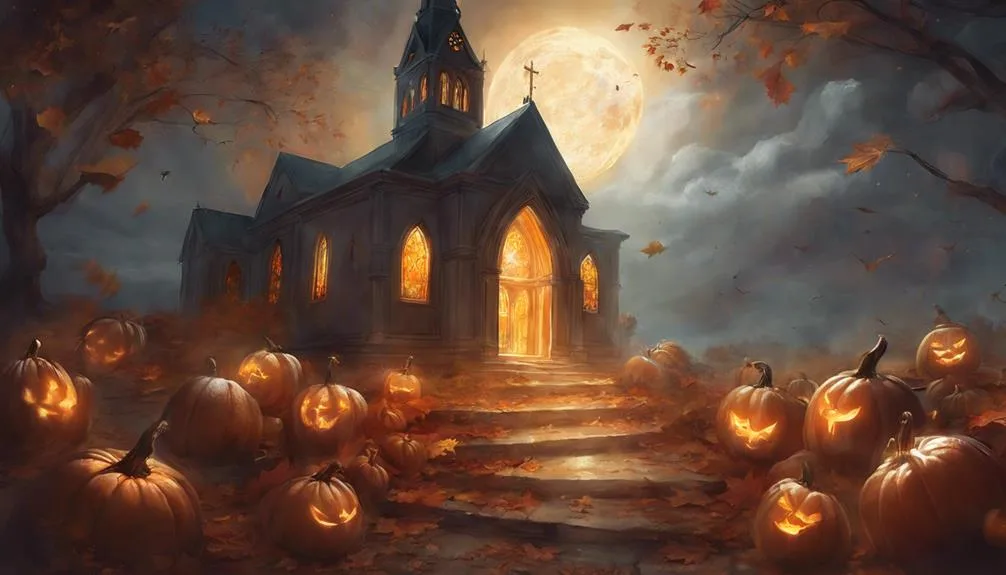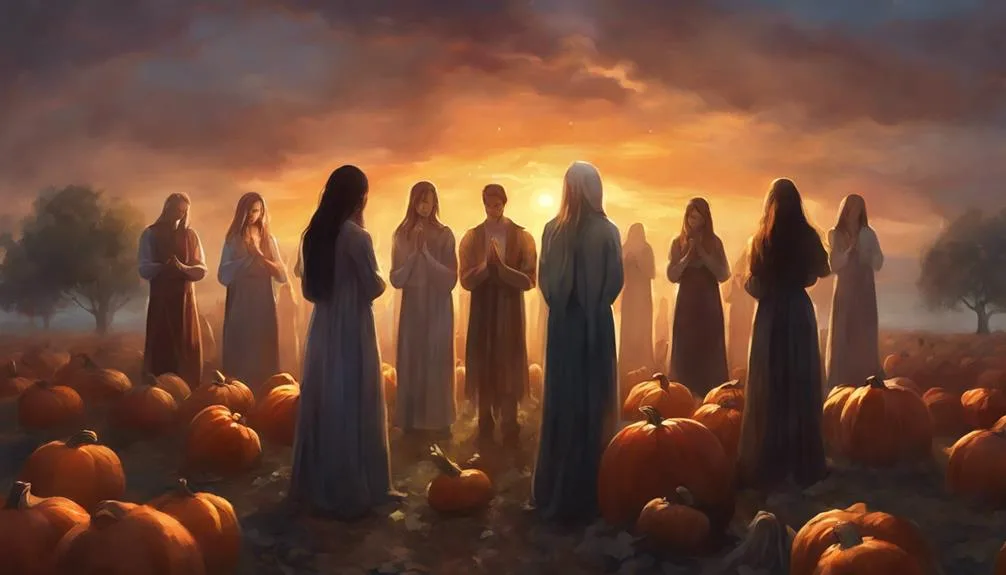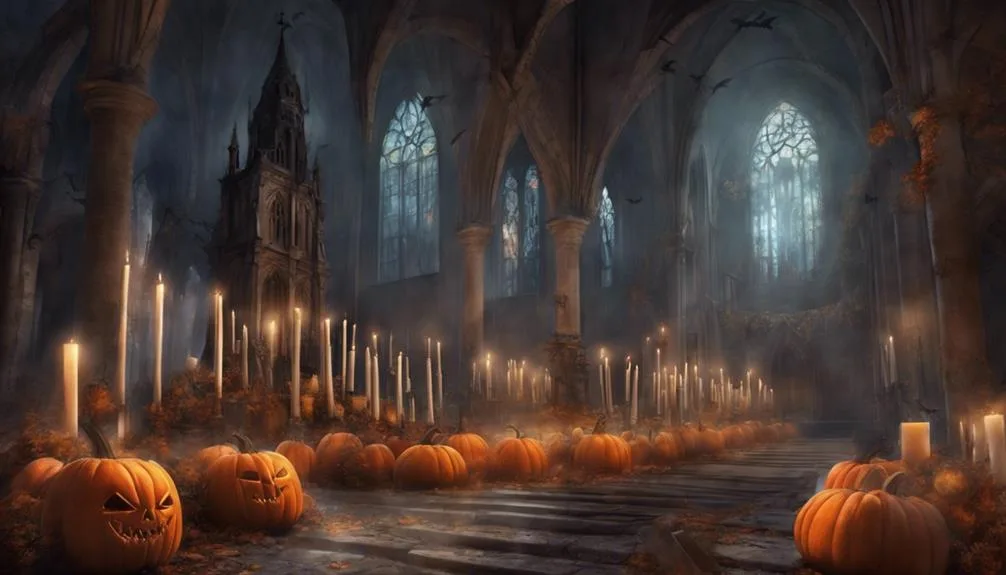The topic of Christians celebrating Halloween brings up mixed feelings. Some see it as just a fun day, while others worry about its pagan origins and link to dark themes.
Before deciding, it's useful to look at what the Bible says, the history of Halloween, and other ways to mark the day. This can help you understand the debate better.
Key Takeaways
- Approach Halloween with discernment, prayer, and spiritual warfare.
- Avoid occult practices and prioritize light over darkness.
- Seek God's wisdom and guidance in celebrating.
- Demonstrate Christ's love through actions and choices.
Biblical Perspective on Halloween
In considering the biblical perspective on Halloween, believers are encouraged to discern the spiritual implications of participating in this widely observed holiday. Halloween, with its roots in ancient Celtic traditions and later Christian influences, has become a day marked by cultural celebrations that often involve themes of darkness and fear. As Christians, you're called to engage in spiritual warfare, recognizing that there's a real battle being fought in the spiritual realm. Ephesians 6:12 reminds you that 'our struggle isn't against flesh and blood, but against the rulers, against the authorities, against the powers of this dark world and against the spiritual forces of evil in the heavenly realms.'
The cultural influence surrounding Halloween can sometimes blur the lines between harmless fun and potentially harmful spiritual practices. As you navigate this holiday, it's crucial to approach it with discernment and prayer. While dressing up and trick-or-treating may seem innocent, be mindful of the deeper spiritual implications and the messages being conveyed through these activities. Remember to guard your heart and mind, staying rooted in the truth of God's Word as you engage with the world around you.
Historical Origins of Halloween
Delve into the historical origins of Halloween to uncover the ancient roots that have shaped this widely celebrated holiday. Halloween finds its beginnings intertwined with Celtic customs and pagan influences. To understand the essence of Halloween, one must reflect on its historical underpinnings:
- Samhain Festival: The Celtic festival of Samhain marked the end of the harvest season and the beginning of winter, a time when the boundary between the living and the dead was believed to be blurred.
- All Saints' Day: The Christian holiday of All Saints' Day on November 1st was established to honor all saints and martyrs, possibly influencing the timing of Halloween.
- Soul Cakes: The tradition of 'souling,' where the poor went door to door for soul cakes in exchange for prayers for the dead, reflects the mingling of Christian and pagan beliefs.
- Costume Wearing: Dressing up in costumes on Halloween may have originated from the belief that disguising oneself could ward off evil spirits.
- Bonfires: Bonfires were lit during Samhain to ward off evil spirits, a practice that has evolved into the modern tradition of lighting jack-o'-lanterns.
Christian Views on Halloween Practices

Consider the biblical perspective on Halloween practices as a Christian. When evaluating Halloween activities, it's essential to reflect on Christian perspectives and the spiritual implications they may carry. As a follower of Christ, your choices should align with biblical teachings and values.
Christian Views on Halloween Practices
| Christian Perspective | Spiritual Implications | Biblical Guidance |
|---|---|---|
| Avoiding Occult Practices | Guarding against spiritual harm | Deuteronomy 18:10-12 |
| Emphasizing Light over Dark | Focusing on purity and goodness | Ephesians 5:8 |
| Prayer and Discernment | Seeking God's wisdom and guidance | James 1:5 |
| Community Engagement | Spreading God's love and kindness | Matthew 5:16 |
| Honoring God in All Things | Glorifying God in actions and choices | 1 Corinthians 10:31 |
Alternatives to Halloween Celebrations
To honor your faith and uphold biblical principles during the Halloween season, exploring alternative ways to celebrate can align with your Christian beliefs and values. Embracing fall festivals and engaging in family activities can provide meaningful and enjoyable alternatives to traditional Halloween celebrations.
Here are five alternatives to consider:
- Attend Fall Festivals: Participate in local fall festivals organized by churches or community centers. These events often include wholesome activities like pumpkin decorating, hayrides, and apple picking.
- Organize a Family Game Night: Gather your loved ones for a night of board games, charades, or other fun activities that promote togetherness and laughter.
- Host a Harvest Party: Celebrate the season of harvest by hosting a party with delicious fall-themed treats, warm beverages, and uplifting conversations.
- Volunteer at a Shelter or Food Bank: Use this time to give back to your community by volunteering at a shelter or food bank. Helping those in need is a fulfilling way to spend the Halloween season.
- Plan a Nature Walk: Enjoy the beauty of autumn by going on a nature walk with your family. Take in the vibrant colors of the changing leaves and appreciate God's creation together.
Final Thoughts on Halloween for Christians

In discerning your stance on Halloween as a Christian, remember to uphold the values and beliefs that align with your faith. As you navigate the debate surrounding Halloween traditions, consider viewing it through a Christian perspective. Reflect on whether partaking in Halloween activities contradicts your spiritual convictions or if it provides an opportunity to share the light of Christ in a dark world.
For Christians, the final thoughts on Halloween should center on glorifying God in all that you do. Whether you choose to participate in Halloween festivities or not, let love, kindness, and discernment guide your actions. Use this occasion to demonstrate Christ's love to those around you, whether through your involvement or by offering an alternative that aligns more closely with your beliefs.
Ultimately, remember that your faith should be the compass by which you navigate decisions about Halloween. Seek wisdom through prayer and Scripture, allowing the Holy Spirit to guide you in honoring God while engaging with the world around you.
Conclusion
As Christians navigating Halloween festivities, it's essential to reflect on our faith and how our actions can honor God. Remembering biblical teachings, let love and kindness influence your decision on whether or not to celebrate.
Exploring alternatives that resonate with your values can also be a meaningful way to observe this time. Let your choices shine with the light of Christ and glorify God, embodying the core message of our faith.
What better way to navigate this season than by asking ourselves how our actions can reflect the love and teachings of Christ in every aspect of our lives?

